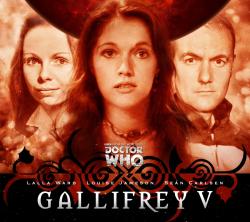
The King of Sontar
Produced by Big Finish
Written by John Dorney
Directed by Nicholas Briggs
Released: January 2014
Diverted to Dowcra, a lump of rock with strategic importance, the Doctor and Leela soon encounter a Sontaran seemingly unlike any other. This is Strang, played very effectively by Dan Starkey, who evidently relishes the chance to portray a darker and far more deadly Sontaran incarnation than that of his recurring TV role. Strang's introduction here, effortlessly taking on a twelve-strong assassination squad, is certainly a stylish statement of intent, and the character challenges pretty much everything that listeners (and the Doctor) think that they know about Sontarans. Amongst other things, this gives rise to an impressive cliffhanger and a sense of mystery that's resolved perhaps a little too soon. I would have welcomed slightly fewer definitive answers regarding Strang’s origins – he seems too good a narrative possibility to be explained away so rapidly. But there’s little sense of a series-long arc being seeded here, and instead this feels far more like a stand-alone opener. Transformatively reinventing a major Doctor Who monster is surely a strong enough idea to sustain a number of stories, though, and on that basis I partly wish Strang had remained more of an enigma for now.
Leela and the Doctor are separated early on in the proceedings, but Dorney makes good use of this common pattern by partnering Leela with Vilhol, a Sontaran wishing to restore his forfeited sense of militaristic honour. Well played by Big Finish regular John Banks, Vilhol – or “the coward”, as he’s become known – is an intriguing character who comes to recognize Leela as a kindred warrior spirit. It’s a rapidly battle-hardened relationship that in turn raises a curious possibility: perhaps this companion of the Doctor’s might feel more at home with an avenging Sontaran than with a universe-hopping Time Lord? And if that’s so, then whose code of honour will Leela ultimately embrace?
“Why are there always alarms?” mutters the Doctor at one point, and sure enough they continue to blare away in the background across this production, with effective sound design constantly lending a sense of urgency to events. Although a few supporting characters feel hemmed in by archetypal structures – you’re rarely in doubt as to what fates are most likely to befall evil mercenaries and misguided scientists – in the end, this story gives Tom Baker and Louise Jameson some great material to work with. Strang may well represent an unusual Sontaran adversary, but by raising the stakes thanks to a Time Lord mission (and an accompanying threat to the universe), The King of Sontar also moves towards an unusual conclusion for the fourth Doctor and his Sevateem student.
Along the way there’s a lot of fun to be had. Strang and the Doctor confront one another via plenty of strong repartee, and David Collings’ turn as the scientist Rosato is also good value. Rosato has been working on a “portal” which could do away with problems such as galactic famine and over-population, as well as coincidentally making him famous, but unfortunately he has become more than a little blinkered in his technological pursuits. And assigned to help with this development, the Doctor seemingly can’t resist being a clever-clogs. However, it is Strang’s excessive monstrosity that becomes the true star turn. Compelling villains often unbalance the stories that they grace, and Strang is almost akin to a Davros-style equivalent for the Sontaran race: a storytelling development opening up new schisms, identities and possibilities. The analogy is another way in which Dorney’s work here seems to have been productively sparked by remembrance of Genesis.
Previous Big Finish fourth Doctor series have been marred by occasional wobbles in quality, but this is undoubtedly a smartly structured and inventive tale. And with the possible exception of a highly stylized performance when the Doctor's being strangled by Strang, Tom Baker is on top form. The same can be said, without reservation, of Jameson (who effortlessly makes “hatchery” seem like a truly alien word) and Starkey, who revels in Strang's self-belief. As a Sontaran experiment of sorts – whether toying playfully with Vilhol’s last syllable of dialogue or posing questions about the Doctor’s educational skills – this consistently yields first-class results.

